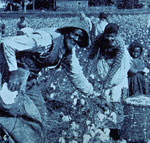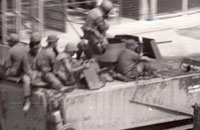Digital Vaults
The National Archives and Records Administration holds more than 10 billion items addressing the social, economic, political, and cultural history of the U.S. This interactive website makes more than 1,200 of those items available, including official documents, personal accounts, images, maps, and ephemera. Browsing is easy from the main page which presents a rotating cast of eight archival items—from an early engraving of the Declaration of Independence, to a top secret document on dropping the atomic bomb, to an image of Navajo code talkers.
More than 550 tags and a keyword search render the items accessible to those interested in specific topics, such as "Abraham Lincoln" (20 items), NASA (19 items), and "Yellowstone National Park" (three items). Each item is accompanied by a brief annotation providing historical context and related tags, further facilitating browsing. All items can be zoomed for highly detailed viewing and rendered printer-friendly for classrooms without computer access.
The website also provides a variety of tools allowing users to collect and manipulate items. "Create" presents the opportunity to make individualized posters and movies out of any item or group of items from the website. After a free login, users can save and email these creations for future use.







